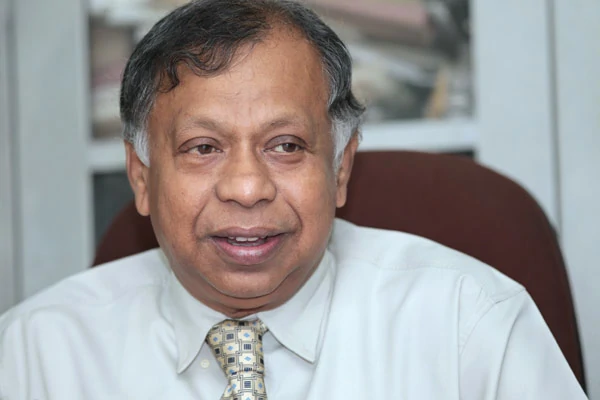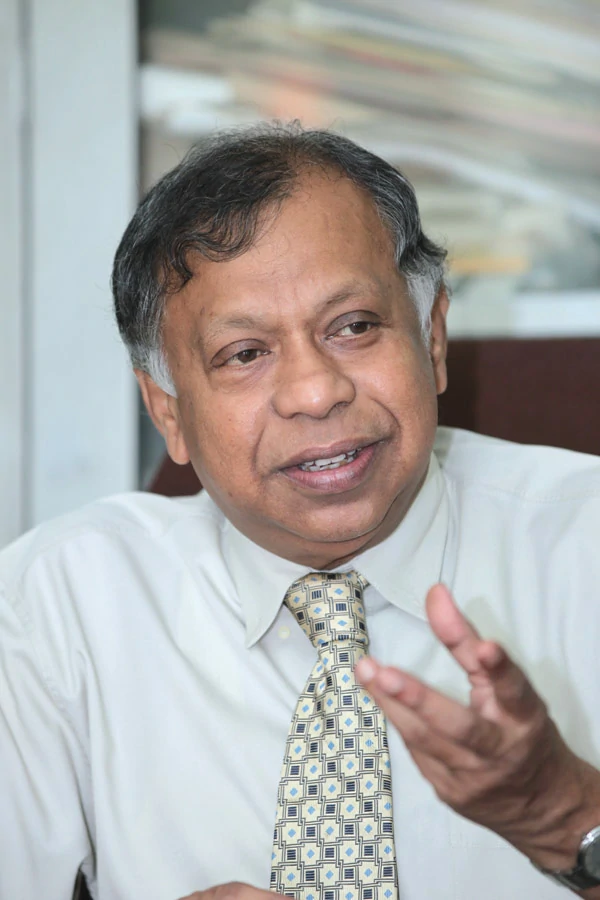
Dr Jayalath Jayawardana has been a UNP Member of Parliament since 1994. As a medical practitioner by profession he has successfully utilised both his roles as a politician and professional to serve the people of this country. The Guinness World Records recognised Dr Jayawardana for the service rendered to the public on preventive healthcare through his weekly television programme, which has been aired, uninterrupted for 14 years. Business Today spoke to Dr Jayalath Jayawardana on this achievement and the importance of professionals engaging in politics.
By Udeshi Amarasinghe
Photography by Menaka Aravinda
Entering politics had been unexpected. Having studied at De Mazenod College and subsequently entering the Colombo Medical College, Jayalath Jayawardana passed out as a medical practitioner in 1980. While as an intern at the National Hospital Colombo, he met the former President, the late Ranasinghe Premadasa where a close friendship was developed. “The moment he became the Prime Minister Mr Ranasinghe Premadasa invited me to be one of his personal doctors. At the time he became the President too, he wanted me to be one of his personal physicians. As President Premadasa was a highly selective person it was a great honour for me to be his physician,” explained Dr Jayawardana. Gradually, he was drawn into the throngs of politics and in 1994 was elected through the National List of the UNP to the Parliament. “Until 2004, I was a National List MP after which I contested from the Gampaha District and have been elected by the people ever since. I do not come from a powerful political family, I come from a very ordinary family from Ja-ela. Therefore this has been a great achievement for me,” reflected Dr Jayawardana.
Highlighting the importance of professionals engaging in politics in Sri Lanka, Dr Jayawardana stated, “I strongly feel that a country like ours should have more professionals taking up politics because of the fact that you need experts to contribute to the development of our country,” while further elaborating that countries in the Asian region such as Indonesia, Malaysia, Singapore and Maldives, are increasingly seeing professionals engaging in politics not only from the field of medicine but from other sectors as well. However, due to the proportional representation system in Sri Lanka it has become increasingly difficult for professionals to engage in politics, explains Dr Jayawardana. He stresses the need for the Sri Lankan voter to think about who they select as their representatives to lead the country as they will be the ones deciding the future of the country.
“You Need Politicians Or Members Of Parliament At The National Level To Prepare The National Policy Of The Country. National Policies Are Not Just For Today Or Tomorrow It Is For Another Few More Years.”
“The Sri Lanka vote base is a very peculiar one. Most of the voters will go for an actor, singer, a superstar, a cricketer or a sports personality. I too cannot understand the mentality of the Sri Lankan voter,” said Dr Jayawardana, while further adding, “President Premadasa told me that any person can be a politician overnight but to remain in the political arena is the most difficult thing. I have been able to maintain voter confidence for the last 16 years. I do not know how long I will be able to keep it up but it is very difficult.” Focusing on starting his campaign from day one, Dr Jayawardana explains that exorbitant sums of money are not required for an election campaign.
Educating the population on the importance of electing suitable representatives is deemed as the highest priority as according to Dr Jayawardana, “you need politicians or members of parliament at the national level to prepare the national policy of the country. National policies are not just for today or tomorrow it is for another few more years. People should neither expect results immediately nor personal gain or benefits from an elected representative.”
As a National List Parliamentarian in 1994, Dr Jayawardana did not have a specific electorate and as such the entire country was his constituency, therefore after much thought he decided that he would render his services to the North and East of the country, which were severely affected by the conflict. “It was a time when the war was in high intensity and an economic embargo was imposed on LTTE controlled areas. There were no essential life saving drugs or sterilised scissors to cut the umbilical cord of the newborn child, because of that many infants were dying of neonatal tetanus. As a medical doctor I thought I should draw my attention to the people who were suffering in silence and who were helpless,” explained Dr Jayawardana.
While travelling to those areas were done without anyone’s invitation Dr Jayawardana explained that “as a Sinhalese from the majority community, from the south, I had no interest whatsoever, politically or socially in the North and East. But as a human rights activist, a humanitarian, I do not believe in discrimination according to caste, creed, religion or politics. So I opted to go to those areas, of course risking my life.” Dr Jayawardana was further inspired by President Nelson Mandela and Bishop Desmund Tutu, whom he had the honour of meeting and advised him that building trust between the two communities was essential to end the 30 year long conflict. Thereafter he began his free medical clinics in the North and East of the country. “I did not go to the LTTE controlled areas with the permission or on the request of the LTTE. I had nothing to do with the LTTE. Nobody wanted me to go there. On my own I went and I have delivered more than hundred babies with my very own hands. No gloves and under very remote conditions, no lights, no medical assistance, no midwives and at times the babies were delivered under the trees,” explained Dr Jayawardana.
However, Dr Jayawardana was cautioned by President Mandela and Bishop Tutu that he would be looked upon with suspicion by both the LTTE and his own community. “Of course as President Nelson Mandela and Bishop Edmund Tutu predicted, I was labelled as a spy by the LTTE, as a pro LTTE man and a link between the UNP and the LTTE. But I did not stop, not only my life even the lives of my innocent two children, my mother, and my wife became highly vulnerable, at the hands of Sinhala extremists,” said Dr Jayawardana.
“I Will Serve The People Of Our Country As Long As The People Require My Services. We Need To Ensure That This Country Belongs To All Communities Irrespective Of Caste, Creed, Religion Or Politics.”
Continuing his service to the people by educating them on medical and health issues, as ‘prevention is better than cure’, Dr Jayawardana sought to utilise his profession, which he says, “I was born after independence of Sri Lanka and I have enjoyed the facilities of free education and became a doctor because of the free education in this country. Once qualified as a medical practitioner I obtained my postgraduate qualification from USA, Russia, Switzerland and EU. Therefore I felt that I should use my expert knowledge, to serve the people.” Sri Lanka is a country that provides free medical care and much money is spent to treat preventable diseases. “If we educate our people many preventable diseases, including fatal diseases like AIDS, infections, diarrhea, infectious hepatitis, typhoid and other such communicable diseases can be prevented,” explained Dr Jayawardana.
Therefore taking a step forward Dr Jayawardana utilised the media as a mode of communication to educate people on preventive healthcare and as such a weekly television programme was started. “In Sri Lanka, our media is powerful. You find very good magazines like Business Today, which are at international standard. Many TV channels, but none of the channels were telecasting medical programmes. As such I started a medical programme on TNL. I realised the value and the importance of a medical programme. I have been continuously hosting the show for 14 years, uninterrupted,” explained Dr Jayawardana. More than 500 medical experts ranging from medical consultants, professors and senior lecturers have been interviewed on Vaidya Hamuwa. Explaining further Dr Jayawardana said, “from the simplest diseases like fever, cough and cold up to the most complicated diseases like, myocardial infarction or fatal cancers have been discussed. Furthermore topics ranging from surgery, medicine, paediatric, plastic surgery, cardiothoracic surgery, orthopaedic surgery, genitourinary surgery, gastroenterology, you name it we have addressed it on the programme”. In order to dispel medical myths and prevent self-diagnosis and self-medication, educating the public is deemed important. “We have to eradicate medical myths. For example, there are still people who feel that cataract should not be operated. And they go blind. Even glaucoma, which is high pressure in the eyes, is at times not treated which results in blindness. Today diabetes, one of the commonest diseases among the adult population of our country, has become the silent killer. Diabetics are prone to heart attacks, chronic renal failures and diabetic retinopathy. People do not realise this, therefore through this programme we aim to prevent diseases through education,” explained Dr Jayawardana.
In acknowledgement of Dr Jayawardana’s uninterrupted service to the public for 14 years thereby educating a large section of the population on preventive healthcare; the Guinness World Records recognised Dr Jayalath Jayawardana for the Vaidya Hamuwa programme as the longest on-going medical programme in the world. “I would like to name my Guinness Record as a people’s achievement. It was given purely for the service rendered by me to the society, to mankind,” reflected Dr Jayawardana.
“I feel that I have set an example to the members of parliament all over the world. Our parliament was officially established in 1835, and during the last 176 years, no parliamentarian has kept any Guinness Record in Sri Lanka. This is the first time, that a Sri Lankan parliamentarian has kept a Guinness World Record for serving the people,” stated Dr Jayawardana proudly.
Recognition for Dr Jayawardana did not stop there. In the first issue of the official journal of the Commonwealth Parliamentary Association Dr Jayawardana has been projected as a peoples’ educator based on the service rendered through his professional background to educate the people about preventive healthcare.






